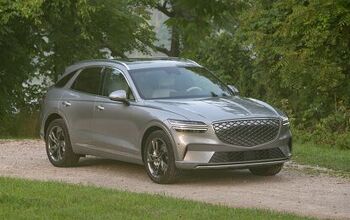Volkswagen Diesel Lawsuit Ends in German Settlement

German consumer group VZBV has reached an agreement in its class-action lawsuit against Volkswagen over the use of illegal software intended to cheat emissions testing. The settlement amounts to 830 million euros (roughly $912 million USD). While not nearly as sizable as what U.S. customers received in their settlement, it’s what VW believes its European customers deserved. Citing a breakdown in negotiations with VZBV earlier this year, the automaker said it was willing to offer €830 million and wasn’t interested in shelling out any extra for litigation attorneys who allegedly wanted €50 million for handling the case.
The manufacturer seems to have gotten its way, though we doubt VW considers shelling out another billion to handle a five-year-old scandal a major victory.
Volkswagen garnered some hard criticism in Europe after claiming the defeat devices it confessed to using in U.S. cars were always intended to improve vehicular emissions (and didn’t act as intended) during the largest class action suit in the United Kingdom’s history. In Germany, the issue was that residents didn’t have the same legal protections as the United States and were thereby ineligible for compensation.
Apparently not, according to the Higher Regional Court of Braunschweig (Brunswick). It’s totally fine with the idea of a German payout. The company said it’s working on how best to process the settlement and issue payments. Those are expected in to begin in March, with entitled customers receiving their compensation as a lump sum. Volkswagen’s chief corporate council also said the business will provide legal advice as required and on request, if necessary.
“The agreement is good news for customers. We and the Federation of German Consumer Organisations [sic] have achieved a fair and verifiable settlement solution,” Hiltrud Werner, the VW board member responsible for Integrity and Legal Affairs, said in a statement. “We would like to thank the president of the Higher Regional Court for his constructive approach as a conciliation judge and will now do everything in our power to offer and make the one-time payments as quickly as possible.”
[Image: U.J. Alexander/Shutterstock]

A staunch consumer advocate tracking industry trends and regulation. Before joining TTAC, Matt spent a decade working for marketing and research firms based in NYC. Clients included several of the world’s largest automakers, global tire brands, and aftermarket part suppliers. Dissatisfied with the corporate world and resentful of having to wear suits everyday, he pivoted to writing about cars. Since then, that man has become an ardent supporter of the right-to-repair movement, been interviewed on the auto industry by national radio broadcasts, driven more rental cars than anyone ever should, participated in amateur rallying events, and received the requisite minimum training as sanctioned by the SCCA. Handy with a wrench, Matt grew up surrounded by Detroit auto workers and managed to get a pizza delivery job before he was legally eligible. He later found himself driving box trucks through Manhattan, guaranteeing future sympathy for actual truckers. He continues to conduct research pertaining to the automotive sector as an independent contractor and has since moved back to his native Michigan, closer to where the cars are born. A contrarian, Matt claims to prefer understeer — stating that front and all-wheel drive vehicles cater best to his driving style.
More by Matt Posky
Latest Car Reviews
Read moreLatest Product Reviews
Read moreRecent Comments
- Jalop1991 Way to bury the lead. "Toyota to offer two EVs in the states"!
- Jalop1991 I'm sorry, Dave. I'm afraid I can't do that.
- Jalop1991 We need a game of track/lease/used/new.
- Ravenuer This....by far, my most favorite Cadillac, ever.
- Jkross22 Their bet to just buy an existing platform from GM rather than build it from the ground up seems like a smart move. Building an infrastructure for EVs at this point doesn't seem like a wise choice. Perhaps they'll slow walk the development hoping that the tides change over the next 5 years. They'll probably need a longer time horizon than that.


































Comments
Join the conversation
"...though we doubt VW considers shelling out another billion to handle a five-year-old scandal a major victory" Not so fast. That's chump change to VW in exchange for making this just go away. https://www.thetruthaboutcars.com/2020/02/volkswagen-offers-900-million-to-german-diesel-owners-says-lawyer-are-greedy/#comment-9873118
“…though we doubt VW considers shelling out another billion to handle a five-year-old scandal a major victory” Prolong foot-dragging lessens the severity of an offense? Also, you mispronounced "willful criminal acts" as "scandal". A "scandal" would be something like a PR department head having email revealing their true opinion of their customers publicly published. This was a crime. Willful fraud on its customers and legitimate regulators.